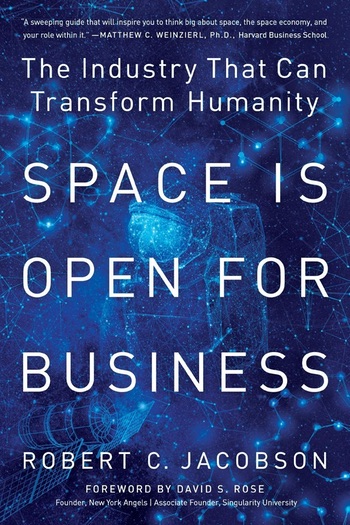Review: Space Is Open for Businessby Jeff Foust
|
| This time seems different, at least so far, but is that really the case, and if so, why? Has the industry really taken off, or just not run out of runway yet? |
Much of the book covers familiar ground for readers of this publication, from the rise of SpaceX and other startups, such as Planet and Spire, to the surge in venture capital investment that has followed and the markets, existing and potential, they will pursue. The book also touches upon regulatory and policy issues, including, in an appendix, a detailed list of more than 20 policy recommendations to support the industry. Jacobson leverages his own experience and expertise, but also draws upon dozens of others quoted in the book, primarily entrepreneurs and investors.
The book is something of a sales pitch for the commercial space industry. Jacobson touches on a lot of different companies and markets, and is generally very optimistic about the future of the industry. And if you’re such a successful investor that the prospect of a new trillion-dollar market isn’t enough to get you out of your hyperbaric sleep pod, there’s one chapter titled, “Space Can Do Quadrillions.”
That approach means there’s not a lot of skepticism in the book. “In the 1990s, there were no public plans on private space projects,” he writes in one early chapter, arguing that Dennis Tito’s flight to the International Space Station in 2001 triggered a “domino effect” of activity. Yet, in the 1990s there were a lot of private space ventures, from launch (Kistler Aerospace, Rotary Rocket Company, Space Access LLC) to satellite constellations (Globalstar, Iridium, Teledesic) and space tourism (the many X Prize competitors.) By and large, those companies failed; the best-case scenario was going through Chapter 11, like Globalstar and Iridium, wiping out the stakes of the original investors. This time seems different, at least so far, but is that really the case, and if so, why? Has the industry really taken off, or just not run out of runway yet?
Jacobson doesn’t shy away from the failure, discussing some ventures like XCOR Aerospace, which he had invested in. Another he mentions is SpaceIL, the Israeli team that formerly competed in the Google Lunar X Prize, proceeded with its mission despite the prize expiring, only to crash. He notes SpaceIL has talked about doing a “Beresheet 2.0”, but doesn’t mention that, nearly 18 months after that crash, the team hasn’t announced what that mission will be or when it will fly.
Industry advocates have long argued about the potential of space to transform society, but by and large it’s been just that: potential, not yet realized. That may finally be changing, but by how much, and how fast, remains unclear. Space Is Open for Business argues it’s doing so quickly, but even double-digit growth rates sustained over a decade might be a bit much.
Note: we are temporarily moderating all comments submitted to deal with a surge in spam.
